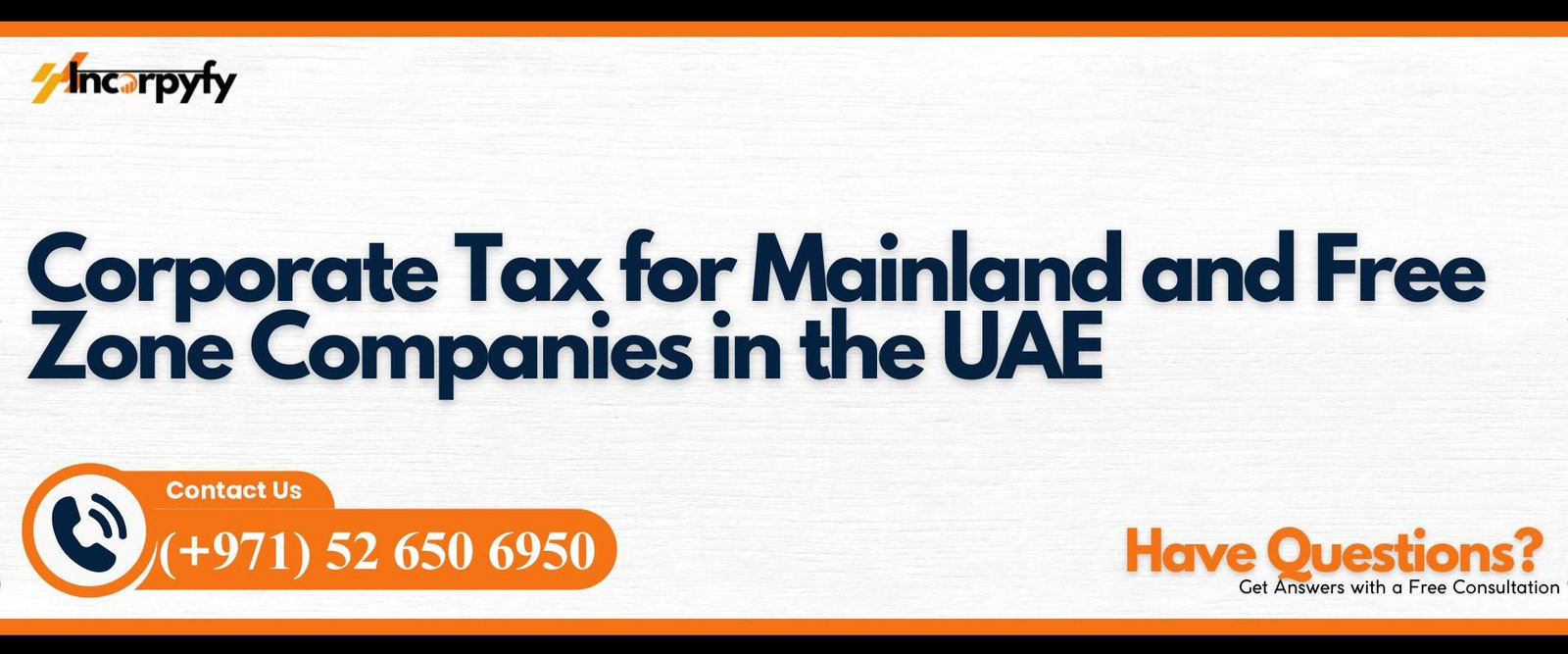
Understanding corporate tax in the UAE is now essential for both mainland businesses and free zone companies. Since the introduction of the UAE corporate tax regime, companies across the emirates must ensure they meet all compliance, registration, and filing obligations. This detailed guide will explain how corporate tax applies to mainland and free zone entities, outline the applicable rates, discuss exemptions, and provide clarity on what companies need to do to stay compliant.
What Is Corporate Tax in the UAE?
The UAE corporate tax is a direct tax on business profits. It was introduced to align the country with international tax standards, increase transparency, and diversify government revenue. It applies to all businesses operating in the UAE, with specific provisions for free zone companies and mainland companies.
Overview of the Corporate Tax System
- Effective from: 1 June 2023
- Tax authority: UAE Federal Tax Authority (FTA)
- Applicability: Mainland and free zone companies, with some exemptions
- Threshold: Businesses with net profits exceeding AED 375,000 are taxed
Corporate Tax Rates
- 0% on taxable income up to AED 375,000
- 9% on taxable income above AED 375,000
- 15% for multinationals meeting the OECD’s Pillar Two rules (i.e. global revenues over EUR 750 million)
Corporate Tax for Mainland Companies in the UAE
Mainland companies are subject to full corporate tax obligations. They are required to register, file returns, and pay tax on profits exceeding AED 375,000.
Who Must Register?
- All legal entities licensed on the UAE mainland
- Branches of foreign companies operating in the UAE
How Is Taxable Income Calculated?
Taxable income is calculated by taking the accounting profit from audited financial statements and making certain adjustments, such as:
- Non-deductible expenses
- Exempt income
- Transfer pricing adjustments
Corporate Tax for Free Zone Companies in the UAE
Free zone companies have a special status under the UAE corporate tax law. They may enjoy 0% corporate tax if they meet the Qualifying Free Zone Person (QFZP) criteria.
What Is a Qualifying Free Zone Person?
To qualify for 0% tax, the free zone company must:
- Maintain adequate substance in the UAE
- Earn qualifying income
- Not elect to be taxed at standard rates
- Comply with transfer pricing and other reporting obligations
What Is Qualifying Income?
- Transactions with other free zone persons
- Income from international trading
- Income from owning and exploiting intellectual property
If the company earns non-qualifying income (e.g. income from UAE mainland customers), the 9% tax rate may apply to that portion.
Corporate Tax Registration Process in the UAE
All businesses are required to register for corporate tax with the Federal Tax Authority.
Steps to Register for Corporate Tax
- Create an FTA account on the EmaraTax portal
- Submit registration application with business documents
- Receive Tax Registration Number (TRN)
It is mandatory even for companies expecting 0% tax to register.
Deadline for Registration
The deadline depends on the license issuance date. Fines apply for late registration.
Corporate Tax Filing and Payment Requirements
After registration, companies must file annual tax returns and pay any tax due.
Key Filing Requirements
- File within 9 months after the end of the financial year
- Submit audited financial statements
- Make tax payments by the filing deadline
Failure to file on time may result in penalties and interest.
Tax Exemptions in the UAE Corporate Tax System
Certain entities are exempt from corporate tax:
Exempt Entities Include:
- Government and government-controlled entities
- Extractive businesses (oil & gas)
- Qualifying investment funds
- Public and private pension funds
Transfer Pricing Rules in UAE Corporate Tax
All related party transactions must comply with transfer pricing regulations. This means companies must:
- Maintain arm’s length pricing
- Keep proper documentation and benchmarking reports
This applies to both mainland and free zone companies.
Corporate Tax for Small Businesses in the UAE
The government has introduced a small business relief scheme:
Eligibility for Small Business Relief
- Revenue below AED 3 million
- Relief available until end of 2026
If eligible, these businesses are treated as if they have 0% taxable income.
Penalties and Compliance Risks
Companies failing to meet their obligations may face:
- Fines for late registration
- Penalties for non-filing or inaccurate returns
- Increased scrutiny from tax authorities
Corporate Tax Planning Strategies for UAE Companies
Being proactive helps businesses reduce risks and optimize tax exposure.
Key Tax Planning Tips
- Conduct a tax impact assessment
- Restructure to meet qualifying criteria
- Maintain proper books and records
- Review contracts for tax implications
VAT vs Corporate Tax in UAE
These are separate regimes:
- VAT: Indirect tax on goods and services (5%)
- Corporate Tax: Direct tax on profits (0% / 9%)
Many businesses must comply with both regimes.
Free Zone vs Mainland: Which Is Better Under Corporate Tax?
There is no one-size-fits-all answer. It depends on your business model.
Free Zone Advantages
- Possible 0% corporate tax
- Ideal for international trading and digital businesses
Mainland Advantages
- Access to wider local market
- More flexible business activities
Conclusion
The introduction of corporate tax for mainland and free zone companies in the UAE marks a big shift in the region’s business landscape. Whether you’re a small trader, a multinational, or a free zone entity, staying compliant is essential. Understand your obligations, prepare early, and seek expert guidance to avoid surprises.
Incorpyfy is a leading business setup consultants company in Dubai, UAE that helps you register for corporate tax, maintain compliance, and choose the best business structure suited for your goals.
FAQs
Is corporate tax mandatory in the UAE?
Yes, all businesses (mainland or free zone) must register for corporate tax even if they fall under the 0% category.
Are free zone companies exempt from corporate tax?
Only if they qualify as a Qualifying Free Zone Person and earn qualifying income.
How do I register for corporate tax in the UAE?
Through the EmaraTax portal by submitting your business details and documents.
When is the corporate tax return due?
9 months after the end of the financial year.
Can I be fined for not registering?
Yes. Late registration leads to penalties and potential disruption of operations.
Is there tax on personal income in the UAE?
No. The UAE does not levy tax on personal income.
What documents are needed for corporate tax filing?
Audited financial statements, transfer pricing documentation (if applicable), and supporting records.
Is VAT still applicable after corporate tax?
Yes. VAT (5%) and corporate tax operate independently.
What is the small business relief in UAE?
Businesses with revenue under AED 3 million can apply for small business relief until 2026.
Can I get help from consultants for corporate tax?
Yes. Working with professionals like Incorpyfy ensures smooth compliance and better tax planning.






